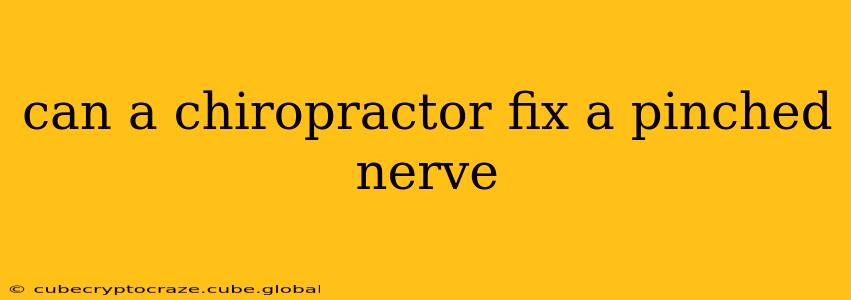Can a Chiropractor Fix a Pinched Nerve?
A pinched nerve, also known as a compressed nerve, occurs when surrounding tissues, such as bones, muscles, tendons, or ligaments, put pressure on a nerve. This pressure can cause pain, numbness, tingling, and weakness in the affected area. Many people wonder if a chiropractor can help alleviate this condition, and the answer is nuanced. While a chiropractor can't fix a pinched nerve in the sense of surgically repairing damaged tissue, they can often provide effective treatment to reduce pain and improve function.
How Chiropractors Approach Pinched Nerves
Chiropractic care focuses on the musculoskeletal system and its impact on the nervous system. Chiropractors primarily use manual adjustments and manipulations to restore proper alignment of the spine and joints. In the case of a pinched nerve, this may involve:
- Spinal adjustments: These gentle or forceful manipulations (depending on the individual and the specific problem) aim to correct subluxations – misalignments of vertebrae that may be contributing to nerve compression.
- Mobilization: This involves gentler movements of the joints to improve range of motion and reduce stiffness, which can lessen pressure on the nerve.
- Soft tissue therapy: Techniques like massage, trigger point therapy, and myofascial release can help relax tense muscles that are potentially contributing to nerve compression.
- Lifestyle advice: Chiropractors often provide guidance on posture, ergonomics, and exercise to help prevent future nerve compression issues.
What Conditions Benefit From Chiropractic Care for Pinched Nerves?
Chiropractic care can be beneficial for pinched nerves stemming from various sources, including:
- Cervical radiculopathy (neck pain radiating to the arm): Chiropractic adjustments can help alleviate pressure on nerves exiting the cervical spine.
- Lumbar radiculopathy (low back pain radiating to the leg – sciatica): Similar to cervical radiculopathy, spinal adjustments may ease pressure on compressed nerves in the lower back.
- Thoracic outlet syndrome: This condition involves compression of nerves and blood vessels in the space between the collarbone and first rib. Chiropractic adjustments may help improve the space and reduce compression.
- Carpal tunnel syndrome: While not directly involving the spine, chiropractic care may address related postural factors contributing to carpal tunnel symptoms.
When Chiropractic Care May Not Be Sufficient
It's crucial to remember that chiropractic care is not a cure-all for every type of pinched nerve. In some cases, more serious medical intervention may be necessary. These instances include:
- Severe nerve damage: If the nerve is significantly damaged or compromised, surgery might be required.
- Underlying medical conditions: Pinched nerves can be a symptom of other conditions like tumors, infections, or autoimmune disorders. These underlying conditions need to be addressed medically.
- Lack of improvement: If your symptoms don't improve or worsen after a course of chiropractic treatment, it's crucial to consult your physician or other healthcare professional to explore alternative treatment options.
What are the different types of pinched nerves?
Pinched nerves can occur anywhere in the body where nerves travel through confined spaces. The specific type depends on the location of the compression. Common types include: cervical radiculopathy (neck), lumbar radiculopathy (lower back), thoracic outlet syndrome (shoulder/neck), and carpal tunnel syndrome (wrist). Each location presents unique symptoms and requires a tailored treatment approach.
How long does it take for a chiropractor to fix a pinched nerve?
There's no single answer to how long it takes for chiropractic care to alleviate pinched nerve symptoms. The recovery time varies depending on the severity of the nerve compression, the individual's overall health, and their response to treatment. Some individuals experience significant relief within a few sessions, while others may require more extensive care.
What are the risks associated with chiropractic care for a pinched nerve?
While generally safe, chiropractic adjustments carry some potential risks, although they are rare. These can include temporary soreness, headaches, or worsening of symptoms in some instances. It's vital to choose a licensed and experienced chiropractor and discuss any concerns you have before starting treatment.
What is the difference between a pinched nerve and a herniated disc?
A herniated disc occurs when the soft, gel-like center of an intervertebral disc pushes through a tear in the outer layer, potentially compressing nearby nerves. A pinched nerve is a broader term that encompasses various causes of nerve compression, including herniated discs. A herniated disc is one possible cause of a pinched nerve.
Disclaimer: This information is for educational purposes only and should not be considered medical advice. Always consult with a qualified healthcare professional before starting any new treatment, including chiropractic care. They can properly diagnose your condition and determine the most appropriate course of action.
